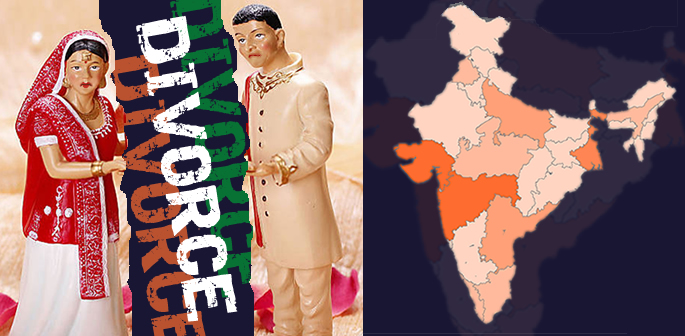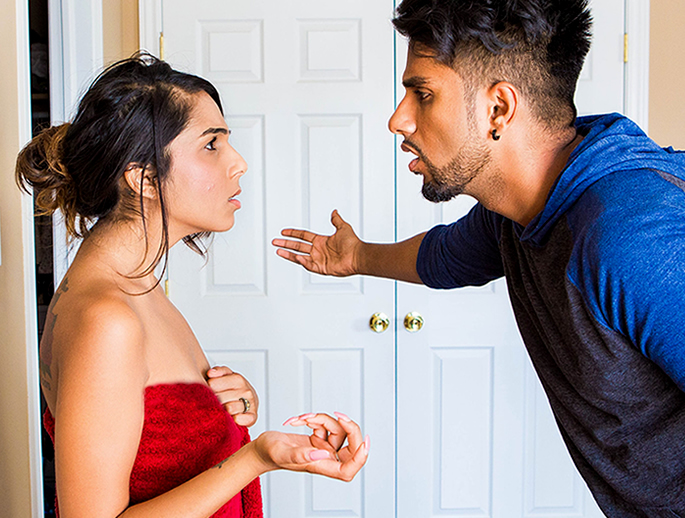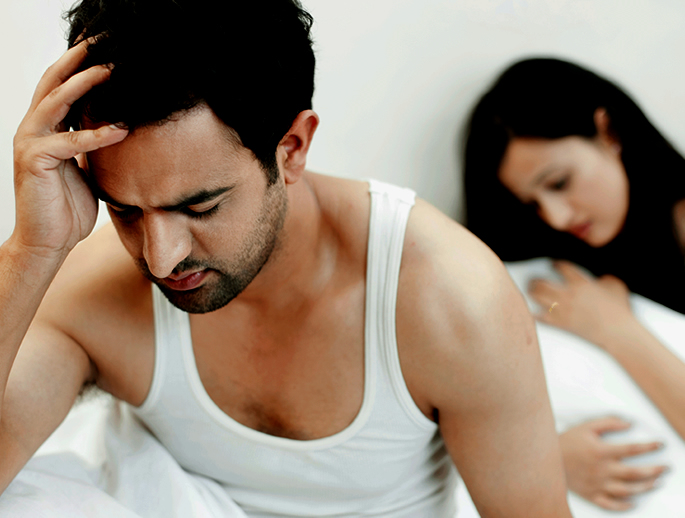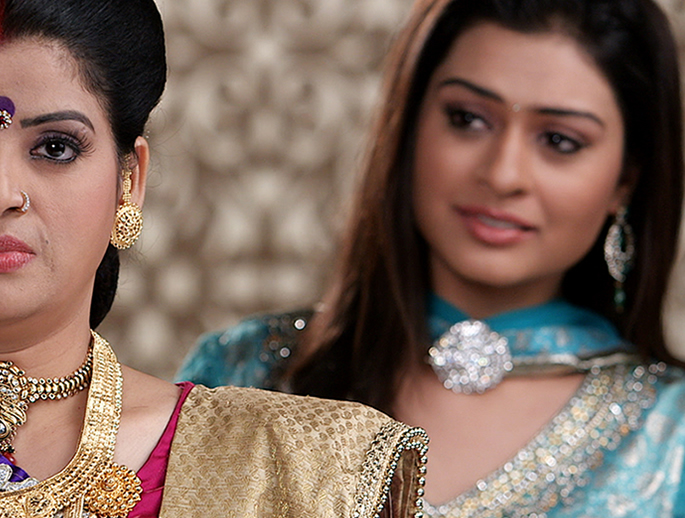"The only way out for me was divorce and after 2 years of marriage, I filed for divorce."
Divorce in India is increasing. Fact.
The days of Indian marriages lasting more than 25 years and couples working things out are now a thing of the past.
Many people will blame the increase of love marriages in the country but the fact is that arranged marriages are still the dominant practice albeit via matrimonial websites or newspapers for introductions.
Divorce in arranged marriages is also rising. So, it is not just the type of marriage that is the reason but changes in many other aspects of Indian life and society which are the reason for the rise of divorce in India.
The internet, smartphones and increased knowledge and awareness about life and rights and independence amongst Indian women are all contributing to why marriages are succeeding or failing.
Changes to the way Indian couples are envisaging their futures has a strong correlation with divorce in the country. No longer are the old-fashioned views of staying in a marriage for the sake of family, children or society, dictating how individuals wish to live their Indian life.
People are now exploring more and more, the easy way to get a divorce in India. Awareness of divorce laws in India is increasing. Be it divorce in Hindi or English. Mutual consent for Indian divorce is also becoming common.
Marital relationships of any kind, be they love marriages or arranged marriages can face issues, and when the problems become intolerable and unable to manage, divorce is the option that many Indians are taking.
We take a look at 7 reasons that are becoming a common cause of divorce in India.
Independence of Indian Women
With the advent of Indian women getting better education, freedom and gaining more independence, it is allowing them to be more in control of their lives. And divorce is something Indian women who have no kind of dependency on a man, will readily opt for, to leave a life not working for them anymore.
Indian women have become independent not just financially but mentally, socially and physically too.
In the past Indian women ‘stuck it out’ with husbands mainly due to the financial dependency. Today, women no longer have to rely on the man and are not putting up with lazy, abusive or destructive Indian men and extended families who are not giving them a marriage that gives them the respect, regard or compatibility they want.
Veena Bhargava, aged 25, says:
“Before my marriage, we courted for about 3 years. I was working as a reporter and he a software developer. We were happy and got married. But then he said he preferred that I not work anymore and focus on having a family. I’m headstrong and enjoyed my work. This became a big problem for us and we ended up divorcing.”
With elders reducing their input into marriages and not providing support to help resolve issues; rather than giving marriages time, talking patiently and trying to solve problems, it is becoming more difficult for couples to tolerate and adjust to each other. Therefore, making divorce an option for Indian women and men, who see this as the only way out.
Sushmita, aged 31, says:
“I got divorced last year after an 11-year marriage. Despite being with my husband as a boyfriend for 2 years, the marriage was definitely not working. I have a great job with a good salary and realised I am wasting my life. It’s not been easy because being divorced is not being the same as single. But I have found there are many men very willing to accept my marital status because it does not define you as a person or your character.”
Marriages by many Indian women today are also being accepted on the basis that it will not be the only marriage they have to stay in. If it does not work, they know that divorce in India is a viable option, compared to the past.
Huma Malik, aged 27, says:
“I’ve been married 5 years after an arranged marriage and so far we get on well. We split our financial obligations. He knows I can support myself on my salary and I am not one to rely on him if I ever felt our marriage was not working anymore. Being an independent woman is important for me.”
The independence of Indian women will only now grow and become a bigger part of Indian society, therefore, giving them more choices in relationships, marriage or divorce compared to ever before.
Communication in the Marriage
Communication in an Indian marriage is as important as any other marriage, if not more. Bad communication or very little can impact the marriage in many ways.
From not clearly discussing concerns or clarifying each other’s meanings or not asking the right questions, the marriage can result in suspicion, mistrust and arguments. Many times it is the little things that can trigger bigger issues.
Arguments in any relationship are not a bad thing and can even be healthy. But if they are happening a lot due to a lack of understanding of each other or intolerance of the one person, then this means the marriage is in trouble.
Hemant Kumar, aged 28, says:
“I had an arranged marriage due to the wishes of my parents. At first, everything was fine. But after a few months, my wife just argued over little things and it became unbearable. She was never happy with anything I did for her and compared me to other men in her family. The only way out for me was divorce and after 2 years of marriage, I filed for divorce.”
Conflicts in marriage can be resolved with patience and a clear understanding. With Intolerance and impatience increasing in Indian marriages, divorce seems to be the quick answer. Rather than willing to put in the extra effort to resolve differences.
Then there is the issue of ‘over’ communication which results in one person in the relationship trying to change the other person and their ways to suit their own agenda.
This tends to happen more with women ‘changing’ their man. But comparatively, there are the cases of Indian men using emotions and dominant communication to sway or even force women to do as told. Thus, resulting in a very unhappy marriage.
Geeta Patel, aged 31, says:
“I was married for 12 years. I and my husband use to talk freely about everything. But after he lost his job, he started to change. He began shouting, blaming me and became very forceful in his ways. I was made to feel useless and worthless in our marriage. I just felt like a slave to his needs. One day I told my parents and they did not complain when I divorced.”
One of the most important points about communication in an Indian marriage is that it has to carry on post ‘honeymoon-moon’ period.
When communication reduces gradually over time, the marriage starts to get difficult and one party can feel ignored or taken for granted. It can impact sex life in the marriage too. Therefore, introducing the thought of divorce as an option, especially for the person not feeling needed anymore.
Cheating and Affairs
Cheating and affairs are major contributors to divorce in India.
This issue has grown with the advent of smartphones and apps providing the ability to contact people at a ‘swipe and tap’ of a screen. Cheating on a marriage partner once was done mostly by men but today married Indian women are also engaging in affairs. Albeit secretly, it is happening, be it with single people or other married partners.
Kuljit Brar, aged 30, says:
“I was dating girls before I got married at college. After about a year of an unhappy arranged marriage, I became friends with a girl on an app and confided in her, next thing, we started to have an affair.”
Many Indian women in marriages are even aware of their husbands having affairs and ‘turn a blind-eye’ due to their age or years in the marriage. But it does not mean the dynamics of the marriage are happy anymore.
Deepika Sehgal, aged 41, says:
“I realised a few years into my marriage that when my husband was away for work, he was having affairs. However, my parents would be devastated if I divorced. So, I built a life around my children and a circle of friends who also experienced similar marriages.”
With Indian women being more independent and working with men, affairs are a reality. If a married woman has an affair it is seen far worse than a man and therefore, is literally unforgivable and most likely results in a divorce.
Tina Fernandes, aged 26, says:
“After having an arranged marriage for 3 years. I began to realise my marriage was sexually not fulfilling my needs as I had dated before my marriage. I began having an affair with someone at work. My husband found messages on my phone I forgot to delete. It turned ugly and he filed for divorce.”
Having an affair is the one thing that is destructive to a marriage, once found out. It destroys trust, desire, love and care but for many, the marriage will carry on due to family and society pressures.
Today, with compatibility reducing in Indian marriages, affairs and cheating are one of the biggest reasons for Indian divorces.
Sexual Problems in Marriage
Sex is an important part of marriage for personal intimacy and having a family. It nurtures the emotional side of the relationship via the physical.
With arranged marriages, sex for many Indian couples can be a very anxious time, especially on the first night. For those with little sexual experience, marital expectations can present challenges.
Being a virgin is not the issue it used to be in Indian marriage, but it can still raise suspicions and insecurities in men if an Indian wife is not a virgin. There have been divorces due to virginity tests.
Vinod Rao, aged 27, says:
“Before we got married, my wife told me she had dated and was not a virgin. I too had dated, so it felt okay. After we got married, life was fine until a few years later, we met an ex of hers. After which I could stop thinking of them together in the past. This led to endless suspicions and long arguments. She could not handle my mistrust. So, we ended up divorcing.”
Sex is an aspect of marriage that needs understanding, communication and effort. Its frequency can change over time. Especially, after the first few years or having a family. This can lead to one or both partners not showing interest in each other sexually and therefore, can result in affairs and an unhappy marriage.
For Indian men with impotence and erectile dysfunction issues, sex in the marriage can be profoundly affected. Divorce in India due to these reasons is a growing problem. In the olden days when these issues surfaced, the wife was blamed for being infertile and she was even impregnated by another male in the family, to keep face for society.
Zareena Shah, aged 25, says:
“I found that my husband had difficulties in the bedroom. He was impotent and our sex life began to be a problem. He would avoid sex and would not accept it as his problem. He would not seek medical help as I was willing to go with him. The problem contributed to our divorce, two years later.”
Conversely, if an Indian woman has issues conceiving a child, this can have a huge effect on the marriage too leading to divorce. Also, for those with orthodox beliefs, not having a son has led to divorce in India too.
A more recent issue of sexual orientation is impacting Indian marriages. Where it is discovered that the married man may be homosexual or bisexual, which is resulting in divorces. Especially, in arranged marriages where these things are not openly disclosed.
Kajal Sharma, aged 23, says:
“After my studies, my parents found me a rishta. I was fine with it. We got married and after a few months, I noticed his behaviour and interest in sex was not normal. Our sex life was not very enjoyable. I then found he had been meeting men secretly using gay apps on his phone. This explained a lot, so I divorced him.”
Problems with In-Laws
Indian marriages are influenced, supported and inspired by family. But also, sadly, marriages are destroyed by family too. Especially, extended family.
The most common marital issue is that of the in-laws and the daughter-in-law. Especially, the conflict between daughter-in-law and mother-in-law. Research says about 60% of Indian marriages have tensions between the two.
Breakdown of Indian marriages where the daughter-in-law is not good enough for the in-laws is one of the biggest reasons for divorce in India. From issues like ‘not enough dowry’ to ‘not being part of the family’ to ‘stealing the son from the family’ are all typical examples of the cause.
Sushmita Jain, aged 27, says:
“As a wife and daughter-in-law, I learned to ignore, forgive and forget so many things during my marriage of 5 years. But one day, I was publically accused of destroying my husband’s life by his mother (who never really got on with me) and he could do better. That was it. I told them to go ahead, do better and I divorced him.”
There have been so many horrific cases of daughter-in-law physical abuse by Indian families which have ended tragically. However, today many Indian women are no longer tolerating such abuse and are divorcing.
Ayesha Ali, aged 28, says:
“My in-laws made my life unbearable. Not a day would go without criticism of me. My mother-in-law would complain and make stories up about me to my husband. At first, he did not believe anything. But one day after a huge row, he beat me and got violent. I told him our marriage was over. After a bitter legal fight, we divorced. I am so happy I did.”
Many husbands do not support their wives when it comes to arguments and rows with his own family. Leaving the wife most vulnerable and turning to divorce as the answer. But this is changing gradually with education playing a strong role.
The trend of Indian married couples living by themselves is helping reduce the tensions but it is not stopping certain husbands asking for more dowry demands or expecting a wife to do as told. Resulting in divorces even in rural parts of India.
However, it is not just the wife’s in-laws causing issues. There are many cases of persistent interference from the wife’s parents into the marriage. Causing conflict, misunderstandings and added pressure for the husband. Parental involvement in the affairs of husband and wife can cause major issues and even lead to divorce.
Deepak Saini, aged 31, says:
“I was married to my wife for 12 years before I divorced. The reason, her parents. They were wealthy and at first, I thought they were trying to help but then it became more clear they were constantly trying to make me feel lower and not good enough. Even my wife joined in. So, I filed for divorce with joint-custody for our children, which they would not agree to but had to.”
There are also cases of wives who have played the victim card or manipulative mind-games or not tried to have a relationship with their in-laws, which have gradually destroyed the dynamics a perfectly happy family which did treat her well. So, it is not always the in-laws.
Sham Marriages and Misuse of Law
Whilst most Indian marriages are for the right reasons, there are others which are for the wrong reasons.
Sham marriages are where marriages are arranged between parties for a purpose other than to really spend a life together. These include marrying another for money, marrying to stay in a foreign country and also marriages of convenience, where the two people are from the LGBT community.
These kinds of marriages can end up in divorce in India once they are found out or declared void.
Then there is the recent rise in the misuse of Indian law, the IPC (Indian Penal Code) 498-A. This is where Indian women are using the law in their favour to divorce easily by approaching the police, media or women’s support group and filing a complaint against the husband and in-laws.
False cases of dowry demands, abuse, harassment and domestic violence are used by women and their families to exit marriages with a divorce in their favour.
Manoj Tiwari, aged 29, says:
“After an arranged marriage of a year, my wife started to argue and get me angry. One night she called the cops on me and said I was hitting her which I never did. She got me arrested on false charges. She played all the drama in front of them. The marriage ended in divorce and she got everything in her favour. She then left town.”
There have been many examples like this where Indian women are marrying intentionally for their own betterment by financially gaining out of divorces. Also, these women have boyfriends or lovers in other towns with whom they plot and scheme such marriages. It is especially the case with those marrying abroad.
These are only seven prominent reasons causing divorce in India. There are many more issues facing Indian couples that are leading to a continual rise in divorce.
In a country where divorce is still not as high as other nations around the world, it is growing and it is changing the landscape of Indian marriage and society compared to the past.
Leading to more understanding required for divorcees, especially women and support for children who are from broken families, because divorce can impact them most. Therefore, divorce laws in India for child custody are becoming more important.
Divorce in India will need tolerance in the country as it adjusts to new ways of life. Potentially, it could result in happier people escaping bad marriages, which were once seen as a way of life.




































































